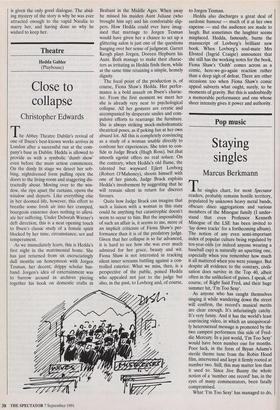Theatre
Hedda Gabler (Playhouse)
Close to collapse
Christopher Edwards
The Abbey Theatre Dublin's revival of one of Ibsen's best-known works arrives in London after a successful run at the com- pany's base in Dublin. Hedda is allowed to provide us with a symbolic 'dumb show' even before the main action commences. On the dimly lit stage we detect her sob- bing, nightdressed form pulling open the doors to the living-room and staggering dis- tractedly about. Moving over to the win- dow, she rips apart the curtains, opens the window and departs. Like everything else in her doomed life, however, this effort to breathe some fresh air into her cramped, bourgeois existence does nothing to allevi- ate her suffering. Under Deborah Warner's deft direction, this is a neat opening touch to Ibsen's classic study of a female spirit blocked by her time, circumstance, sex and temperament.
As we immediately learn, this is Hedda's first night in the matrimonial home. She has just returned from six excruciatingly dull months on honeymoon with Jorgen Tesman, her decent, drippy scholar hus- band. Jorgen's idea of entertainment was to burrow around in archives piecing together his book on domestic crafts in Brabant in the Middle Ages. When away he missed his maiden Aunt Juliane (who brought him up) and his comfortable slip- pers. How Hedda could ever have imag- ined that marriage to Jorgen Tesman would have given her a chance to set up a glittering salon is just one of the questions hanging over her sense of judgment. Garret Keogh plays Jorgen, Doreen Hepburn his Aunt. Both manage to make their charac- ters as irritating as Hedda finds them, while at the same time retaining a simple, homely dignity.
The focal point of the production is, of course, Fiona Shaw's Hedda. Her perfor- mance is a bold assault on Ibsen's charac- ter. From the first moment we meet her she is already very near to psychological collapse. All her gestures are erratic and accompanied by desperate smiles and corn pulsive efforts to rearrange the furniture. She is always striking mock-melodramatic theatrical poses, as if poking fun at her own absurd lot. All this is completely convincing as a study of a woman unable directly to confront her experiences. She tries to con- fide in Judge Brack (Hugh Ross), but .that smooth egotist offers no real solace. On the contrary, when Hedda's old flame, the talented but wayward Ejlert Lovborg (Robert O'Mahoney), shoots himself with one of her pistols, Judge Brack exploits Hedda's involvement by suggesting that he will remain silent in return for discreet favours.
Quite how Judge Brack can imagine that such a liaison with a woman in this state could be anything but catastrophic doesn't seem to occur to him. But the impossibility of such an affair is, it seems to me, more of an implicit criticism of Fiona Shaw's per- formance than it is of the predatory judge. Given that her collapse is so far advanced, it is hard to see how she was ever much admired for her grace, beauty and wit. Fiona Shaw is not interested in tracking silent inner screams battling against a con- trolled exterior. What we miss, then, is a perspective of the public, poised Hedda who appealed not just to the judge but also, in the past, to Lovborg and, of course, to Jorgen Tesman.
Hedda also discharges a great deal of sardonic humour — much of it at her own expense — and the audience are made to laugh. But sometimes the laughter seems misplaced. Hedda, famously, burns the manuscript of Lovborg's brilliant new book. When Lovborg's soul-mate Mrs Elvsted (Ingrid Craigie) announces that she still has the working notes for the book, Fiona Shaw's `Oohh' comes across as a comic, here-we-go-again reaction rather than a deep sigh of defeat. There are other occasions too when Fiona Shaw's comic appeal subverts what ought, surely, to be moments of gravity. But this is undoubtedly a memorable performance and one whose sheer intensity gives it power and authority.


















































 Previous page
Previous page